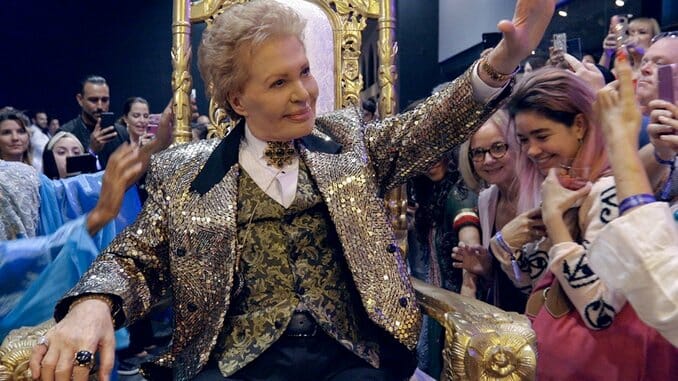Mucho Mucho Amor Proves that Walter Mercado’s Cosmic Legacy Cannot Be Categorized

For many of us, our identities are the strongest connection we feel to some semblance of self-awareness. They offer us the ability to see ourselves reflected in others who share our particular labels—bisexual, INTP, woman, New Yorker, Sagittarius. These facets of ourselves—some more concrete than others—allow us to move through the world with an idea of who we are and what we’re doing. When it comes to looking at the future, the most cathartic way to face the unknown could be through understanding that our fate is not our own, merely a product of where the stars were positioned during the moment of our birth. Without the decades-spanning work of Puerto Rican tele-astrologer Walter Mercado, the nonchalant act of announcing your sign to everyone from potential lovers to your therapist might not have entered the cultural zeitgeist to the degree which it has.
Conversely, Christina Costantini and Kareem Tabsch’s Netflix documentary, Mucho Mucho Amor: The Legend of Walter Mercado, has a hard time categorizing the many complexities of its subject. Filmed during the year before Mercado’s death at age 87, the film revels in the ostentatious nature of the late astrologer, whose boldly androgynous appearance rendered him both approachable yet otherworldly, attracting factions of devout fans, particularly from hispanic and latino communities. While Mercado’s message was one that promoted peace, love and unity, the multitalented performer-turned-television personality was often publicly scrutinized for his gender-nonconforming sensibilities. His jewel-encrusted capes, luscious hair and perpetually pursed lips provoked homophobic comments and jokes while tandemly comforting young queer people who watched his show, Mercado being one of their first cultural touchstones for rejecting gender norms.
Of course, the burning question on everyone’s mind during Mucho Mucho Amor is, frankly, if Mercado will finally embrace a distinct label for himself. As a TV personality in the ’70s, ’80s and ’90s—decades where homophobia ran rampant in the entertainment industry, especially during the height of the AIDs epidemic—it was widely speculated that Mercado coming out would jeopardize his career. Yet even within a current cultural climate that is far more accepting of LGBTQ and gender fluidity, it seems that Mercado continued to resist the urge to apply labels to himself.
When asked by the interviewer why he has never openly talked about his sexuality, Mercado simply responds: “Because I have sexuality with the wind, with the flowers in the garden, with all the beautiful display of nature.” When the interviewer takes it a step further by implying shock at the fact that Mercado is essentially confessing to being a virgin, he chuckles: “I’m the only one in town.”
Yet many can’t seem to understand Mercado’s enigmatic aura without attempting to make sense of his identity. He is referred to in the film by interviewees and fans alike as a “non-binary asexual,” which in their attempt to bring Mercado into a supportive community also negates the inherent fluidity of his nature. Even when it comes to spiritual worship, Mercado states that all religions have a “point of convergence,” allowing him to take the most positive aspects from spiritual practices globally. He would not label himself as a Catholic, Buddhist, Hindu or even Bruja—he is simply all of those things, but also not really any of them at all.
It’s easy to believe that a life-long profession on la pantalla pequeña, especially within a culture where machismo is rigidly imposed and embraced by men, would ingrain in Mercado such deep-seated resistance against embracing a queer identity. His niece Ivonne—one of many who appear in the film to speak of their close relationship with their tío—makes it clear that his mere appearance of television was no small feat.